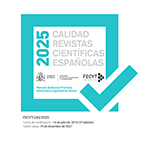La formación académica sobre los libros y la lectura a través de los estudios de comunicación no verbal
Abstract
With the growing use of audiovisual means, nonverbal communication studies offer invaluable help in the formation of children, adolescents and adults as readers of printed books, sensitizing them, first, to their interaction with books as objects sensorially and intellectually appreciated, which enriches their "reading act." The aim is to make them conscious of the complex grid of verbal and nonverbal components (plus the multiple functions of possible graphic illustrations) present in a literary text, namely, the many sensorial (direct and, most important, synesthesial) and intelligible experiences, including somatic, extrasomatic and environmental sounds, whether described or evoked in the printed text, as well as explicit or implicit silences which readers must experience also during their reading. To which we should add four dimensions treated here too: the influence on readers of both personal circumstances and the environment while reading; the reader's desirable mute or audible oralization of the text; the specific characteristics of the reading act when it is seriously limited by different states of reduced interaction, such as blindness or paralysis; and the adult readers' retroactive attraction of books they read in their childhood and adolescence, which should make us foster the good care of books in those age periods.Downloads
Article download
License
In order to support the global exchange of knowledge, the journal Didáctica. Lengua y Literatura is allowing unrestricted access to its content as from its publication in this electronic edition, and as such it is an open-access journal. The originals published in this journal are the property of the Complutense University of Madrid and any reproduction thereof in full or in part must cite the source. All content is distributed under a Creative Commons Attribution 4.0 use and distribution licence (CC BY 4.0). This circumstance must be expressly stated in these terms where necessary. You can view the summary and the complete legal text of the licence.










